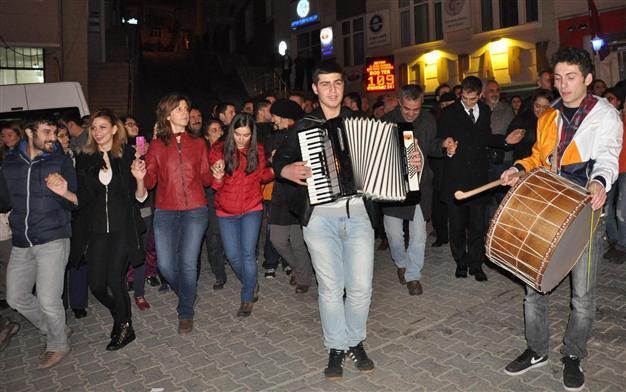Istanbul airport contractor’s copper mine project in natural haven halted
ARTVİN

Locals in Artvin celebrated the court's landmark decision with music and the traditional horon dance. DHA Photo
Cengiz Construction’s dreams of extracting copper in the eastern Black Sea has been halted by the law, just days after a court similarly prevented Kolin İnşaat, a fellow partner in the winning consortium for the third Istanbul bridge, from building a coal plant on an olive plantation on the Aegean.
A local administrative court suspended the works for the establishment of a copper mine in the green uplands of Artvin, ruling that a controversially approved environmental impact assessment report (ÇED) should be reviewed, daily BirGün reported.
The mining company set to operate the facility, Eti Bakır, is owned by Mehmet Cengiz’s holding, another contractor close to the government that has been granted many expensive projects across the country. Just like Kolin, Cengiz is among the five companies of a consortium that won a multi-billion dollar tender for Istanbul’s highly controversial new airport. The company is also currently building a coal plant near the Marmara Sea port of Karabiga, which experts warn will cause huge damage to endangered species living in the area.
The mine is set to be established at Cerattepe near Kafkasör, one of the greenest and most beautiful highland meadows in the country. The side is surrounded by the Genya Mountains and the Karçal Mountains further east – the latter are counted among the most important areas in need of protection in the country, according to the World Wide Fund for Nature.
Artvin locals launched legal action after the environmental impact assessment report for the copper mine was accepted following the tender bidding process, organizing a handful of protests to denounce the project with the play on words “Artvin’s surface is more precious than underneath/gold.”
Lawyers representing the locals stressed that the site envisaged for the facility was located only a few kilometers away from the Hatilla National Park, emphasizing the incoherence of exploiting the resources of a region that is simultaneously promoted as a touristic haven.
Members of the opposition, meanwhile, claimed that people had been threatened so as not to oppose the project, implying the close ties between the mining company and those in power was a factor in the fast approval of mandatory environmental reports.
‘The victory of life’But the court’s fresh decision was hailed by local activists fighting against the project who organized voluntary patrols near the area where the facility is planned. “This is the victory of life against these companies. We hope that the court will cancel the project altogether, but we will continue to stand guard. Our struggle will continue until miners leave Artvin,” said Neşe Karahan, an activist for Green Artvin Association.
Activists had managed to block four times an attempt to fell trees for the construction works. A total of 700 trees would have been cut down by the regional Forestry Directorate if the company’s demands received a follow-up. In the Yırca village, near the Aegean coal capital of Soma, some 6,000 trees were cut down in vain by Kolin for a coal plant whose construction was eventually canceled.
Worried that Cengiz could still emulate Kolin and cut down trees in the middle of the night despite the ostensible legal impediments, some protesters in Artvin have preached continued vigilance.
“We’re wary about the possibility that [Cengiz] will not abide by the court’s decision. Nonetheless, this is certainly a victory, and we’re enjoying this win,” said one of those opposing the project, Dursun Ali Koyuncu.
An expert report also warned that the mine could trigger an increased risk of avalanches during the winter. It also said water sources in the surrounding areas could become contaminated due to the chemicals used in the extraction process.
The village of Oriner, which had to move from its locality due to the construction of the Derine hydroelectric plant nearby five years ago, will have to move for a second time if the mine facility is built.
Dozens of projects for mines and hydroelectric plants (HES) have raised huge controversy across the country as most of them are planned in the country’s most important natural areas.
In many cases, locals have taken legal action but have struggled to make their voices heard against energy companies whose projects continue to multiply with the blessing of the government, often despite court decisions ordering halts to construction.
